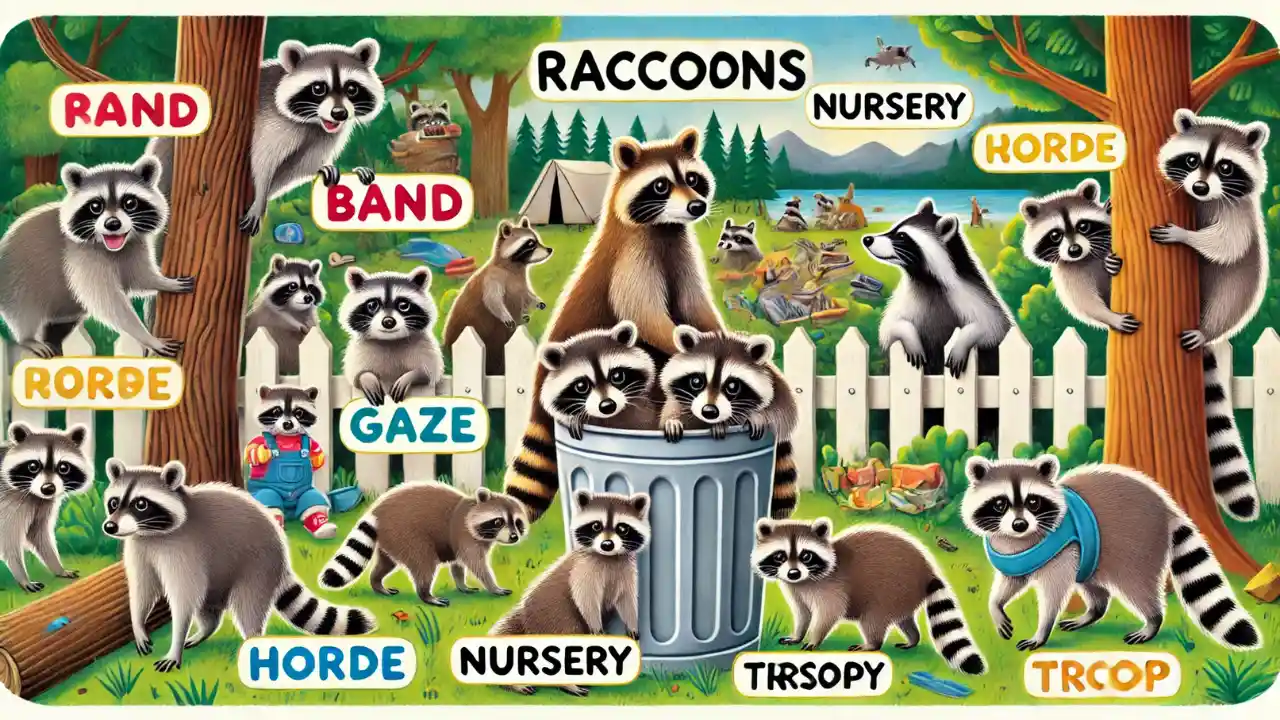Raccoons are clever, curious, and always up to some kind of adventure. These nocturnal creatures are often found in groups, and there are special collective nouns to describe their gatherings. These terms capture the playful and sometimes sneaky nature of raccoons. Let’s dive into the fascinating collective nouns for raccoons and how they’re used!
Collective Noun for Raccoons in Table
Here are some common collective nouns for groups of raccoons:
| Collective Noun | Meaning |
|---|---|
| Gaze | A group of raccoons staring intently |
| Band | A playful or mischievous group of raccoons |
| Nursery | A group of young raccoons being cared for |
| Horde | A large and lively group of raccoons |
| Troop | Raccoons traveling together |
Explanations and Examples
1. Gaze
The term gaze is often used for a group of raccoons watching something attentively, emphasizing their curious and observant nature.
- Example 1: A gaze of raccoons stared at the camper as he cooked his dinner.
- Example 2: We noticed a gaze of raccoons peeking out from behind the bushes.
- Example 3: The gaze of raccoons in the park watched the children play with snacks.
2. Band
The term band reflects raccoons’ playful and mischievous personalities, especially when they’re causing trouble!
- Example 1: A band of raccoons raided the trash cans under the cover of darkness.
- Example 2: We laughed as a band of raccoons worked together to open the picnic basket.
- Example 3: The band of raccoons dashed across the backyard, making off with some apples.
3. Nursery
A nursery is used to describe a group of young raccoons being cared for, often with their mother nearby.
- Example 1: A nursery of raccoons played under the watchful eye of their mother.
- Example 2: The nursery of raccoons climbed the tree together, learning to explore their surroundings.
- Example 3: We observed a nursery of raccoons huddled in a hollow log for safety.
4. Horde
When raccoons gather in large, lively groups, they can be called a horde.
- Example 1: A horde of raccoons scurried across the park, chattering and exploring.
- Example 2: The horde of raccoons swarmed the campsite, searching for scraps of food.
- Example 3: A horde of raccoons appeared near the pond, splashing and playing.
5. Troop
Troop is another term used to describe raccoons traveling together, often in a coordinated way.
- Example 1: A troop of raccoons wandered through the forest, sniffing for berries.
- Example 2: The troop of raccoons moved along the trail, searching for their next meal.
- Example 3: At dusk, a troop of raccoons emerged from the woods and headed toward the creek.
Conclusion
Raccoons are fun and fascinating creatures, and the collective nouns used to describe them highlight their curious and mischievous nature. From a “band” of playful raccoons to a “gaze” of watchful ones, these terms add charm to their already entertaining antics. Next time you see a group of raccoons, you’ll know exactly what to call them!
